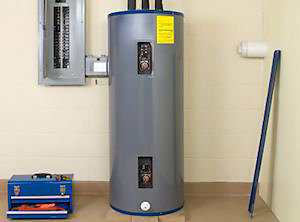Water Heater Buyers’ Guide – Tankless or Traditional?

If you’re in the market for a new water heater, you have a large selection of options and varieties to choose from. All water heaters fall into two main categories: traditional water heaters and tankless water heaters (also called on-demand or instantaneous). We’ve created a water heater buying guide to help you determine which type suits your home best.
What’s the Difference?
Traditional water heaters heat and store water in a large tank. Each time you shower, wash dishes, or run a load of laundry, you consume pre-heated water from the tank. Your water source refills this tank as hot water is used, and the cycle continues.
Tankless water heaters, sometimes called instantaneous or on-demand water heaters, heat water only at the time of use, rather than storing heated water in a tank. When you turn on a hot water tap, cool water runs through the tankless water heater. Its heat source – either electric or gas – instantaneously heats the water on demand.
Which is Better?
When shopping for a water heater, there are many things to consider, including efficiency, convenience, and cost. There is no universally “right” choice, as your decision should be based on your individual needs. We’ve outlined the key differences between the tankless and traditional varieties to help you determine the best selection for your home.
Efficiency – Traditional water heaters devour a lot of energy because a constant supply of heat is needed to keep the stored water hot, even when you are not using any hot water. Tankless water heaters only use energy as you use hot water, making them the more energy-efficient option by a landslide.
Convenience – Generally speaking, a tankless water heater is more convenient because it eliminates the dreaded last-one-up-gets-a-cold-shower dilemma. Tankless water heaters can also save you space, where traditional water heaters typically require a larger amount of space. These compact units can be mounted on a wall, inside or outside your home and supply hot water on demand.
However, some tankless water heaters are too small to supply enough hot water for simultaneous use. For example, if you were showering, running a load of laundry in hot water, and washing dishes in the dishwasher, you could be demanding more hot water than the tankless water heater can supply. (Traditional water heaters would also have a difficult time keeping up with such strenuous demands.) You can avoid this by installing a higher-rated tankless water heater or choosing to install multiple units.
Cost – While tankless water heaters are slightly more expensive, they recoup the cost of their initial installation over the course of their lifetime from decreased energy bills and a longer lifespan. Traditional water heaters are still common because they can be significantly less expensive. But they are also more expensive to operate.
Related Reading
Subscribe To Our Newsletter
Get up-to-date current news, promotions, and industry tips.
